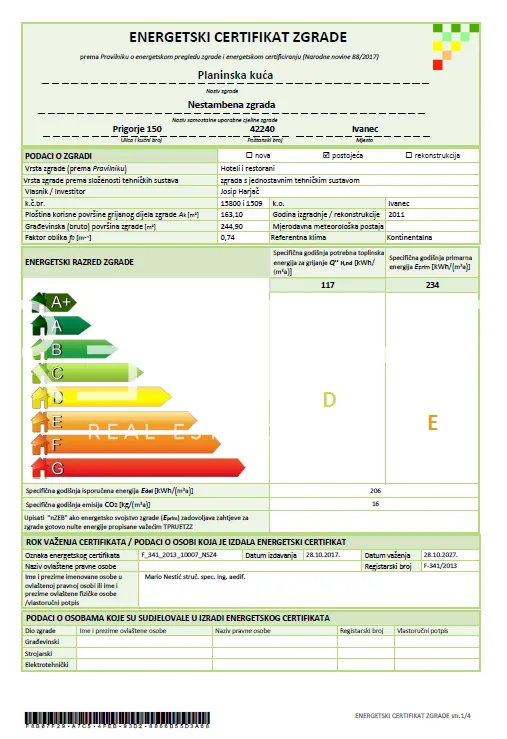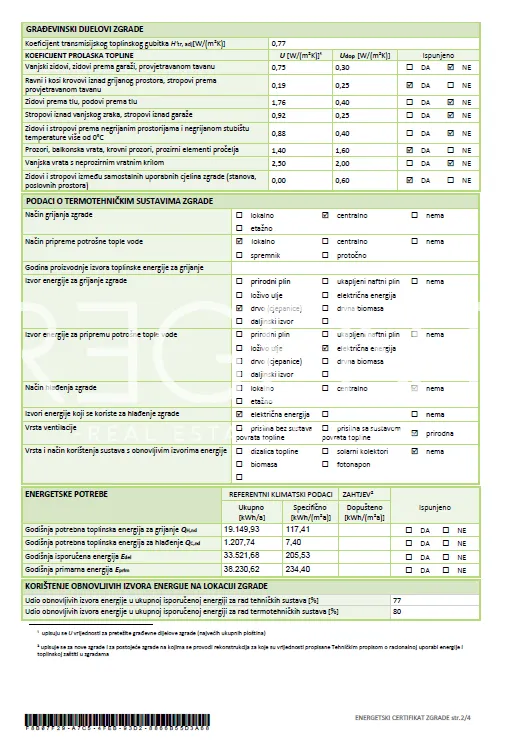
Energy certification is not just a bureaucratic step, but a useful tool for buyers and sellers
Whether you are a buyer or a seller, you have probably already come across information about the needs of energy certification. What exactly should you pay attention to and what is the energy certificate actually for? You might be surprised, but when done professionally, this document is actually full of useful information and guidelines and a good indicator of important features of the property to which it relates. The energy certificate is one of the tools needed to better present and display the energy efficiency of your property to potential buyers if you are a seller. If, on the other hand, you are a property buyer, you want to be sure that the property you have chosen is energy efficient and meets all the necessary standards. An energy certificate helps you make a decision when buying a property more easily. The purpose of energy certification is to classify the building into one of the energy classes, and to provide information to the owners and users of buildings about the energy properties of the building, the efficiency of their energy systems, and the quality and properties of the building. By classifying the building into an energy class, its energy efficiency is determined.
What is an energy certificate?
An energy certificate is a document that presents the energy properties of the building and is prepared by authorized persons for energy certification – energy certifiers.
Energy certification includes several segments: energy audit of the building, the necessary calculations for reference climatic data to express the specific annual required thermal energy for heating, the specific annual required thermal energy for cooling, the specific annual delivered energy, the specific annual primary energy, the specific annual CO2 emissions, determining the energy class of the building and, finally, the creation of the energy certificate itself.
The document is valid for ten years and contains general information about the building, the energy class of the building, the validity period of the certificate, information about the person who issued and prepared the energy certificate, information about the people who participated in the preparation of the energy certificate, the mark of the energy certificate, information about thermotechnical systems, energy needs of the building, information about the use of renewable energy sources, a proposal of measures, more detailed information and an explanation of the content of the energy certificate.
It is issued for a building, i.e. its special part, for which it is necessary to use energy to maintain the internal design temperature in accordance with its purpose, except for:
- a building used for the maintenance of religious rites or religious activities
- a temporary building whose period of use is two years or less, an industrial plant, a workshop and a non-residential agricultural building with small energy needs
- a residential building used less than four months a year
- a free-standing building with a total useful area of less than 50 m2.
The investor, i.e. the owner of the building, is obliged to obtain an energy certificate before the issuance of the occupancy permit, unless otherwise stipulated by law.
The owner of the building, i.e. its special part, is obliged to:
- obtain an energy certificate before selling, renting, leasing or leasing the building or its special part
- hand over the energy certificate or a photocopy thereof to the buyer, tenant, lessee or recipient of the lease
- present the energy certificate to a potential buyer, tenant, lessee or lease recipient
- in the advertisement for the sale, rental, lease or leasing of a building or its special part that is published in the media, state the energy class of the building.
What is the energy class of a building?
The energy class is expressed for reference climatic data and is an indicator of:
- specific annual required thermal energy for heating for reference climatic data and the space use regime and technical systems operating regime prescribed by the Algorithm,
- specific annual primary energy for reference climatic data and the space use regime and technical systems operating regime prescribed by the Algorithm, which in residential buildings includes energy for heating, domestic hot water preparation and ventilation/air conditioning
- and in non-residential buildings includes energy for lighting and energy of thermotechnical systems for a specific type of non-residential building (office buildings, buildings for education, hospitals, hotels and restaurants, sports halls, commercial buildings, other non-residential buildings).
Residential and non-residential buildings are classified into eight energy classes according to the energy scale from A+ to G, with A+ indicating the most energy-efficient class and G the most energy-inefficient class.
How is energy certification carried out?
The inspection of the building is carried out by authorized persons, each in the part of their profession, on the basis of the methodology of conducting energy audits of buildings (a set of actions and procedures for conducting energy audits of buildings, which also contains an algorithm for calculating the energy properties of buildings).
An energy audit of a building includes:
- preparatory work,
- collecting all the necessary data and information about the building that are necessary for conducting the building energy certification procedure and determining the energy class of the building,
- conducting control measurements as needed,
- analysis of consumption and costs of all forms of energy, energy products and water for a period of three previous calendar years,
- a proposal of measures to improve the energy efficiency of the building or to improve the energy properties of the building that are economically justified with the calculation of the investment return period and the sources of prices for the implementation of the proposed measures,
- report and conclusion with recommendations and the order of implementation of economically justified measures to improve the energy efficiency of the building or energy properties of the building.
In the process of conducting an energy audit of the building, analyzes are carried out related to:
- the method of energy management in the building
- thermal characteristics of the external envelope (facade)
- heating system
- cooling system
- ventilation and air conditioning system
- domestic hot water preparation system
- system for the supply, distribution and consumption of electricity
- electric lighting system
- water supply system
- measurement, regulation and management system
- alternative energy supply systems.
New buildings
The energy certificate of a new building is issued on the basis of data from the main project in relation to the rational use of energy and thermal protection of the building, a written statement from the contractor on the works performed and the conditions of maintenance of the building, a visual inspection of the building and the final report of the supervising engineer on the execution if there was an obligation to prepare it.
Existing buildings
Energy certification of an existing building includes an energy audit of the building, the necessary calculations for reference climatic data to express the specific annual required thermal energy for heating, the specific annual required thermal energy for cooling, the specific annual delivered energy, the specific annual primary energy, the specific annual CO2 emissions, determining the energy class of the building and the preparation of the energy certificate.
Existing buildings or their independent functional units that are sold must have a valid energy certificate submitted for inspection to the buyer before concluding the sales contract.
Individual independent functional units of buildings that are rented, leased or leased must have a valid energy certificate available for inspection by the tenant or lessee before concluding the contract on renting, leasing or leasing.
We offer our clients who sign an Exclusive Representation Agreement with Regent a free energy certificate and property valuation. Contact us today and find out more about this great offer!

Currently popular

Chosen by Regent / Real estate
How much is your property really worth? Try an AI valuation.

Chosen by Regent / Real estate
Branded Residences: Why Luxury Buyers Are Increasingly Choosing Properties Signed by Hotels

Chosen by Regent / Real estate
Unique investment opportunity in Zagreb: Luxury penthouse as a long-term value.

Chosen by Regent / Real estate